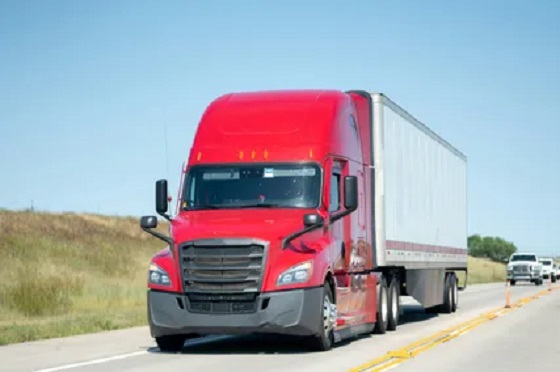National
Trudeau again blames ‘climate change’ for mostly man-made wildfires
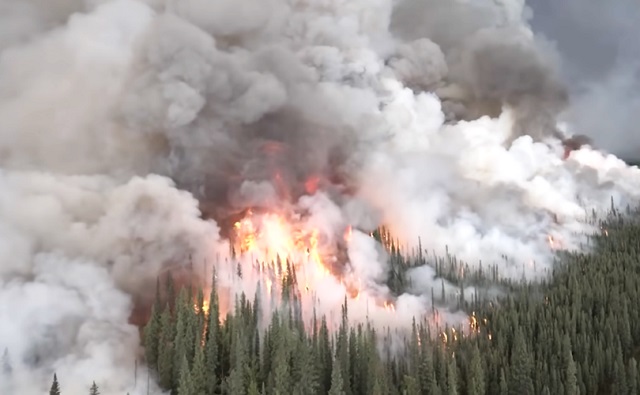
From LifeSiteNews
Trudeau and the media which his government funds appear intent on blaming Canada’s wildfires on ‘climate change’ in what seems to be an attempt to justify radical public policy.
Prime Minister Justin Trudeau and his Liberals are once again blaming Canadian wildfires on “climate change” despite most being man-made.
In a May 10 press release, Prime Minister Justin Trudeau and Deputy Prime Minister Chrystia Freeland lectured Canadians on the so-called dangers of “climate change” amid Canada’s wildfire season, apparently ignoring that data has revealed that most wildfires are man-made.
“Climate change is here, and we’re making sure our communities are ready,” Trudeau stated.
“Last year was the worst wildfire season in Canadian history, and climate change is only causing more frequent and more extreme wildfires,” Freeland claimed.
In addition to the Liberal government, mainstream media outlets have also started publishing articles attributing Canada’s wildfires to “climate change.”
“The seeds of fire activity were sown over the winter and in past years as the world continues to warm because of human-driven climate change,” CNN claimed in a May 15 article.
Despite the claims of the Trudeau government, the Alberta Wildfire Status Dashboard, which tracks wildfires in the province, found that 232 (72.96%) of the wildfires started this year have been linked to human activity. On the other hand, only 1 (0.31%) was caused by lightning, while 85 (26.73%) remain under investigation.
Last month, Alberta Minister of Forestry and Parks Todd Loewen revealed that his department estimates that most of the province’s wildfires this year are man-made.
Additionally, an April study revealed that while global temperatures have “moderately” increased since 1950, the claim that extreme weather events are significantly increasing is unsupported by scientific evidence.
Telling Canadians the same lies as in 2023
Indeed, Trudeau and the media his government funds appear intent on blaming Canada’s wildfires on “climate change” regardless of the facts, similar to their tactics in spring 2023 when Canada faced one of its worst fire seasons.
“Rise in extreme wildfires linked directly to emissions from oil companies in new study,” Canadian Broadcasting Corporation (CBC), which gets 70 percent of its operating budget via tax dollars from the federal government, claimed at the time.
However, similar to now, Trudeau’s claims were unfounded and contradicted both research and wildfire data.
Indeed, despite claims that wildfires have drastically increased due to “climate change,” 2023 research revealed that wildfires have decreased globally while media coverage has spiked 400 percent.
Furthermore, many of the fires last spring and summer were discovered to be caused by arsonists and not “climate change.”
Last year, the Royal Canadian Mounted Police (RCMP) arrested and charged suspected arsonists for allegedly lighting fires across the country, including in the Yukon, British Columbia, and Alberta.
In Quebec, satellite footage also showed the mysterious simultaneous eruption of several blazes across the province, sparking concerns that the fires were a coordinated effort by arsonists.
Why push the ‘climate change’ narrative?
Trudeau’s determination to push the claim that the fires are unprecedentedly dangerous and caused by “climate change” appears by critics to be nothing but an attempt to pass further regulations on natural resources.
The Trudeau government has continued to insist on so-called net zero carbon policies, seeking a complete elimination of the fossil fuel industry in the future.
The reduction and eventual elimination of the use of so-called “fossil fuels” and a transition to unreliable “green” energy has also been pushed by the World Economic Forum (WEF) – the globalist group behind the socialist “Great Reset” agenda – an organization with which Trudeau and some in his cabinet are involved.
While Trudeau’s plan has been pushed under the guise of “sustainability,” his intention to decrease nitrous oxide emissions by limiting the use of fertilizer has been criticized by farmers. They say this will reduce profits and could even lead to food shortages.
Frontier Centre for Public Policy
Ottawa Should Think Twice Before Taxing Churches

From the Frontier Centre for Public Policy
Ottawa has churches in its crosshairs. A federal fiscal squeeze could strip religious organizations of tax breaks, crippling Canada’s community backbone
Proposals to revoke charitable status for faith-based groups would devastate the community services thousands rely on
Canada’s churches, synagogues, temples, mosques and charities like the Salvation Army are at the heart of our communities, offering hope, support and services to thousands. But a storm is brewing in Ottawa that could strip these vital institutions of their charitable status, threatening their very survival—and much of our country’s social fabric.
The 2025 House of Commons Standing Committee on Finance, which makes recommendations to shape the federal budget, dropped a bombshell in its prebudget report, an influential document often used to set priorities for the year ahead. It included two recommendations that could hit religious organizations hard.
The first is that the government revoke the charitable status of pro-life groups. These agencies are being singled out because of the support they provide to pregnant women who do not wish to abort their children.
The second is that the “advancement of religion,” one of the four long-standing categories under which Canadian charities qualify for registration, be eliminated. The recommendation was based on a single proposal by the B.C. Humanist Association, a provincial nonprofit organization in British Columbia that represents atheists, humanists, agnostics and non-religious people.
If included in the next federal budget, these ideas would strip religious organizations across Canada of tax exemptions, the ability to issue donation receipts and, if provinces follow suit, property tax breaks.
Why target these groups?
Ottawa desperately needs the cash. The federal government is on a spending binge of gargantuan proportions with no end in sight. Canada’s balance sheet is drenched in red ink, with no credible plan to address the structural budget deficit, which the C.D. Howe Institute, a Toronto-based policy think tank, estimates will reach a record $92 billion this year. While the tax exemptions amount to only between $1.7 and $3.2 billion annually, the temptation to grab what it can from churches may prove irresistible.
But it’s not just about the dollars. Religious institutions have increasingly faced criticism from secular voices in Ottawa and academia. The Catholic Church, for example, is still facing harsh criticism over its role in Canada’s residential school system and over recent allegations of unmarked graves of Indigenous children at some schools.
As for Protestant and Evangelical churches, public perception casts these institutions as clashing with modern societal norms. Critics claim that churches opposing abortion or prevailing views on human sexuality should be compelled to align with government policies on these issues.
The message seems to be: shape up or ship out. This isn’t just a policy debate; it’s a cultural attack on institutions that have shaped Canada for generations.
Despite the criticism, there are compelling reasons to preserve the charitable status of religious organizations.
First, a recent study by Cardus, a Canadian faith-based think tank, shows that for every dollar of tax exemption, religious groups deliver $10 in community services.
Second, religious congregations offer substantial intangible benefits of immeasurable value. They foster vibrant communities where individuals find friendship, emotional support and spaces to explore questions of meaning and purpose. They also provide opportunities for people to experience a sense of transcendence and spiritual connection.
When the current focus on materialism comes to an end, as it must, many Canadians will turn to the church for guidance in addressing the most profound questions about human existence.
Ottawa needs to get its fiscal house in order, not raid ours. It’s time for Canadians to speak up. Write to your MP, attend community forums and demand that the charitable status for religious organizations be preserved. Doing so will ensure that churches and other places of worship continue to serve Canadians for generations.
Pierre Gilbert, PhD, is an emeritus associate professor at Canadian Mennonite University and a senior fellow at the Frontier Centre for Public Policy. He is the author of Revoking the Charitable Status for the Advancement of Religion: A Critical Assessment and God Never Meant for Us to Die (2020).
Media
Canada’s top Parliamentary reporters easily manipulated by the PMO’s “anonymous sources”

X-post by former PMO chief of staff Norman Spector, who noticed something was up concerning how the Prime Minister’s team got its message out
Press Gallery members denied access to Carney’s Egypt photo opportunity dutifully repeat anonymous, unverified claims elevating the Prime Minister’s importance
Last week, the Parliamentary Press Gallery (PPG) and I had something in common.
We were both dismayed.
They, because they weren’t invited to join Prime Minister Carney on his last-minute trip to Egypt for a photo opp; Me because most of them didn’t seem all that interested in looking into the circumstances of the PM’s hasty departure and instead allowed themselves to be played in the most appallingly obvious manner.
Peter Menzies is a past publisher of the Calgary Herald, a former vice chair of the CRTC and a National Newspaper Award winner.
Subscribe to The Rewrite.
What got the PPG’s knickers twisted was that they weren’t invited to accompany Carney when he departed Ottawa in a rush to get to the Egyptian resort of Sharm El Sheikh, a popular spot on the Red Sea for the world’s glitterati. It took PPG President Mia Rabson a couple of days to issue a statement, but she made it clear the PPG disapproved:
“The Parliamentary Press Gallery was not informed in advance of the Prime Minister’s trip to Egypt to participate in the Middle East Peace Ceremony on Oct. 12 -13,” she wrote. “The Gallery is disappointed and dismayed at the exclusion of Canadian media from the event and expresses in no uncertain terms that this must never happen again.
“It is unprecedented that Canadian media be entirely excluded from a Canadian prime minister’s foreign trip.”
The only reporting I could find on this was in Politico, where it was recorded that the PMO had posted this notice: “6:30 p.m. The Prime Minister will depart for Sharm el-Sheikh, Egypt, to attend the signing of a Middle East peace plan. Closed to media.”
What first caused my jaw to drop and to become, like Rabin, disappointed and dismayed, were the stories left unpursued. On the morning of Oct. 12, Canada was not listed as among the countries invited to join in the “peace summit” associated with the ceasefire deal reached between Israel and Hamas. If it had been, the prime minister may not have had to charter a private jet because the usual Royal Canadian Air Force planes and crews were, as City News’s Glen MacGregor reported, unavailable.
There are two lines of journalistic inquiry there, neither of which appears to have been of interest. The first is: how can Canada’s military be so poorly equipped that there isn’t at all times a fully-equipped aircraft and crew on standby and is this an issue that will be addressed in the future? The second is: how did we wind up getting invited to the peace summit? Comments by US President Donald Trump indicate that we weren’t initially considered important enough to be on site but phoned to ask if we could join the party. (The Line – which doesn’t accept government subsidies – noticed.)
Trump, in remarks to media said: “You have Canada. That’s so great to have, in fact. The president called and he wanted to know if it’s worth – well he knew exactly what it is. He knew the importance. Where’s Canada, by the way? Where are you? He knew the importance of this.”
What was pursued, at least in comments online by journalists, was Trump’s inability to identify Carney by his correct title. (In an exchange that followed, Carney sarcastically thanked Trump for elevating him and, in response, was told “at least I didn’t call you governor.” Ha ha.)
Everyone is free to make their own decisions, but if Canada had to call Trump to ask to be invited, Canadians need to know if that means we are in the president’s debt. Trump, after all, seems like the sort of guy who keeps score.
Readers will notice a new DONATE button has been added.
This allows you to buy The Rewrite a cup of coffee or, if you are feeling generous, wine, but doesn’t constitute a subscription.
Please consider making use of it and help us save journalism from bad journalism.
Share
But it’s what followed that really got creepy. While Canadian reporters were not allowed to accompany the prime minister to Egypt, someone who says he or she was on the plane started phoning around to tell reporters what happened. And they went for it. The Globe and Mail, Toronto Star and Politico all reported unverified statements emanating from a single, unnamed source. The Globe’s Robert Fife reported that “a senior government official” said that while Carney and others thought they were just in Egypt for a photo opp, during a four hour wait for Trump to arrive from Israel “Mr. Carney had back-and-forth conversations with a group of leaders.”
Fife wrote that “The Globe and Mail is not identifying the official so they could speak candidly.”
Tonda MacCharles of the Toronto Star also quoted a “senior Canadian government official” who “spoke confidentially to provide background information on what was discussed at the leaders-only talks.” Said official was buzzing about the dynamism of the occasion and the ever so important role the boss played at the photo opp.
“Imagine the G20 without the talking points and pomp and circumstance. We all came out of it, staffers, like ‘wow that was a useful meeting,’” the anonymous source told MacCharles, whose report, similar to Fife’s, did not indicate that any efforts whatsoever had been made to verify the claims of the “official” with even a second anonymous “official.”
The Globe report expanded on how Carney’s attendance in Egypt was all part of a broader strategy, that he is well-known and liked in the region and how the invitation “was not a surprise” because Carney has “sought” to “act as a go-between Arab states and Washington.”
That doesn’t exactly appear consistent with the source’s concession that Carney’s office “first heard of the invitation on social media” but, whatever.
MacCharles and Fife tried to add greater context to their reports (the former doing the better job, in my view) but while The Free Press’s Rupa Subramanya wondered what all the fuss was about and Brian Mulroney’s former chief of staff Norman Spector (see frame grab above) smelled a rat, my conclusion is that what we have here is unacceptable.
The Prime Minister departed the country unaccompanied by even a single representative of the nation’s press. Upon his return, neither Carney nor any “officials” held a news conference to explain what took place. Instead, targeted media got fed what could be (I’ll use the polite term) pure fantasy. Two of Canada’s leading news organizations, apparently confusing themselves with stenographers, then – and without noting any attempts whatsoever at verification – dutifully passed it all along to their readers on …. faith.
Compare what took place here to what the Associated Press has to say about the use of anonymous sources in politics:
“No one wants news that’s built on unnamed, unaccountable sources and facts seemingly pulled from the air. Politicians and members of the public sometimes have cited such journalism as a reason for the fall in trust in the media….
“Reporting with loose attribution or anonymous sourcing can be dismissed as fake by the skeptical reader or politician. On the other hand, a report filled with verifiable facts attributed to named and authoritative sources of information is impossible to dispute.”
When all was said and done, the coverage of the Prime Minister’s visit to Egypt was denied to journalists and replaced with unchallenged reports from the leader’s staff, just like it’s done in tin pot dictatorships. And not a peep from the nation’s heavily subsidized journalism community.
Not a frickin’ peep.
(Peter Menzies is a commentator and consultant on media, Macdonald-Laurier Institute Senior Fellow, a past publisher of the Calgary Herald, a former vice chair of the CRTC and a National Newspaper Award winner.)
Readers will notice a new DONATE button has been added. This allows you to buy The Rewrite a cup of coffee or, if you are feeling generous, wine, but doesn’t constitute a subscription. Please consider making use of it and help us save journalism from bad journalism.
Subscribe to The Rewrite.
For the full experience, upgrade your subscription.
-

 Business2 days ago
Business2 days agoFord’s Whisky War
-

 Agriculture19 hours ago
Agriculture19 hours agoIs the CFIA a Rogue Agency or Just Taking Orders from a Rogue Federal Government?
-
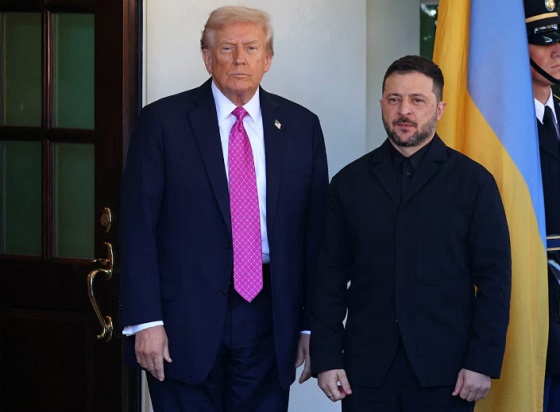
 Focal Points2 days ago
Focal Points2 days agoTrump Walks Back His Tomahawk Tease from Zelensky
-

 Business1 day ago
Business1 day agoTrump Blocks UN’s Back Door Carbon Tax
-
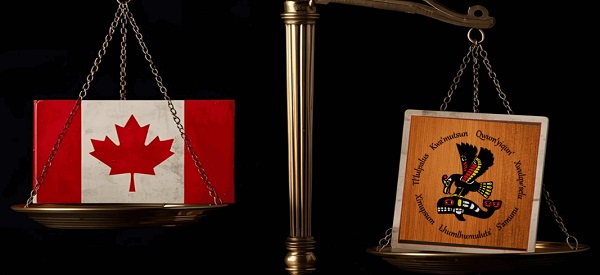
 Business1 day ago
Business1 day agoJudges are Remaking Constitutional Law, Not Applying it – and Canadians’ Property Rights are Part of the Collateral Damage
-

 Red Deer1 day ago
Red Deer1 day agoYour last minute election prep: Common Sense Red Deer talks to the candidates
-

 Automotive2 days ago
Automotive2 days ago$15 Billion, Zero Assurances: Stellantis Abandons Brampton as Trudeau-Era Green Deal Collapses
-
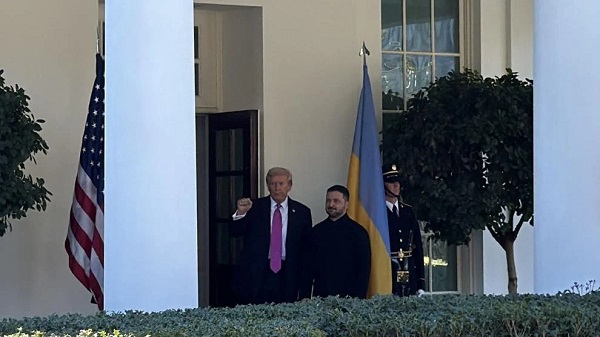
 Daily Caller1 day ago
Daily Caller1 day agoTrump urges Putin, Zelenskyy to make a ‘deal’







